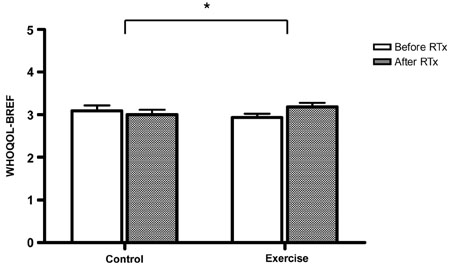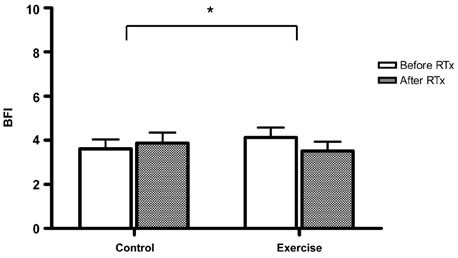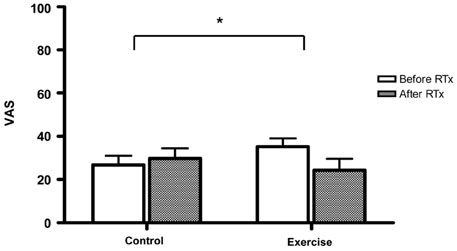Effects of Supervised Exercise Therapy in Patients Receiving Radiotherapy for Breast Cancer
- Affiliations
-
- 1Department of Physical Medicine and Rehabilitation, Samsung Medical Center, Sungkyunkwan University School of Medicine, Seoul, Korea. reh.chj@gmail.com
- 2Division of Sports Medicine, Samsung Medical Center, Sungkyunkwan University School of Medicine, Seoul, Korea.
- 3Department of Radiation Oncology, Samsung Medical Center, Sungkyunkwan University School of Medicine, Seoul, Korea.
- 4Department of Surgery, Samsung Medical Center, Sungkyunkwan University School of Medicine, Seoul, Korea.
- KMID: 724261
- DOI: http://doi.org/10.3349/ymj.2008.49.3.443
Abstract
- PURPOSE
Postoperative radiotherapy for breast cancer has a number of associated complications. This study examined whether supervised moderate-intensity exercise could mitigate the complications that occur during radiotherapy. PATIENTS AND METHODS: Forty women were randomized before radiotherapy after various operations for breast cancer. Seventeen patients who were assigned to the exercise group performed supervised moderate-intensity exercise therapy for 50 min 3 times per week for 5 weeks. Twenty-three patients in the control group were asked to perform self-shoulder stretching exercise. The World Health Organization Quality of Life-BREF (WHOQOL-BREF), brief fatigue inventory (BFI), range of motion (ROM) of the shoulder, and pain score were assessed before and after radiotherapy. RESULTS: There were no significant differences noted at baseline between groups. In the exercise group, there was an increase in the WHOQOL-BREF and shoulder ROM and decrease in BFI and pain score after radiotherapy. On the other hand, patients in the control group showed decrease in the WHOQOL-BREF and shoulder ROM and increase in BFI and pain score after radiotherapy. There were statistically significant differences in the changes in the WHOQOL, BFI, shoulder ROM, and pain score between the groups. CONCLUSION: Patients receiving radiotherapy for breast cancer may benefit in physical and psychological aspects from supervised moderate-intensity exercise therapy.
Keyword
MeSH Terms
Figure
Cited by 4 articles
-
Effects of a 4-Week Multimodal Rehabilitation Program on Quality of Life, Cardiopulmonary Function, and Fatigue in Breast Cancer Patients
Junghwa Do, Youngki Cho, Jaeyong Jeon
J Breast Cancer. 2015;18(1):87-96. doi: 10.4048/jbc.2015.18.1.87.Overview of cancer rehabilitation
Ji Hye Hwang, Joon-Sung Kim
J Korean Med Assoc. 2017;60(8):678-684. doi: 10.5124/jkma.2017.60.8.678.Physical Activity and Fatigue among Pediatric Nurses in a Special Care Unit
Sun-Mi Chae, Eun-Young Suh, Hyun-Myung Jung, Ji-Hye Lee
Perspect Nurs Sci. 2018;15(1):18-28. doi: 10.16952/pns.2018.15.1.18.Establishment of a mouse model of 70% lethal dose by total-body irradiation
Seung-Hyun Ryu, Jong-Hyung Park, Eui-Suk Jeong, Soo-Young Choi, Seung-Hoon Ham, Jin-Il Park, Hee-Yeon Jeon, Jun-Young Kim, Ran-Ji Yoo, Yong-Jin Lee, Sang-Keun Woo, Yang-Kyu Choi
Lab Anim Res. 2016;32(2):116-121. doi: 10.5625/lar.2016.32.2.116.
Reference
-
1. Jemal A, Siegel R, Ward E, Murray T, Xu J, Smigal C, et al. Cancer statistics, 2006. CA Cancer J Clin. 2006. 56:106–130.
Article2. Park EJ, Jeon YW, Han SI, Oh SJ. A preliminary study on the quality of life for patients who had breast cancer operations. J Korean Breast Cancer Soc. 2004. 7:299–305.
Article3. Effects of radiotherapy and surgery in early breast cancer. An overview of the randomized trials. Early Breast Cancer Trialists' Collaborative Group. N Engl J Med. 1995. 333:1444–1455.4. Favourable and unfavourable effects on long-term survival of radiotherapy for early breast cancer: an overview of the randomised trials. Early Breast Cancer Trialists' Collaborative Group. Lancet. 2000. 355:1757–1770.5. Senkus-Konefka E, Jassem J. Complications of breast-cancer radiotherapy. Clin Oncol (R Coll Radiol). 2006. 18:229–235.
Article6. Jereczek-Fossa BA, Marsiglia HR, Orecchia R. Radiotherapy-related fatigue. Crit Rev Oncol Hematol. 2002. 41:317–325.
Article7. Mock V, Dow KH, Meares CJ, Grimm PM, Dienemann JA, Haisfield-Wolfe ME, et al. Effects of exercise on fatigue, physical functioning, and emotional distress during radiation therapy for breast cancer. Oncol Nurs Forum. 1997. 24:991–1000.8. Meyer TJ, Mark MM. Effects of psychosocial interventions with adult cancer patients: a meta-analysis of randomized experiments. Health Psychol. 1995. 14:101–108.
Article9. Decker TW, Cline-Elsen J, Gallagher M. Relaxation therapy as an adjunct in radiation oncology. J Clin Psychol. 1992. 48:388–393.
Article10. Forester B, Kornfeld DS, Fleiss JL, Thompson S. Group psychotherapy during radiotherapy: effects on emotional and physical distress. Am J Psychiatry. 1993. 150:1700–1706.
Article11. Delisa JA, Gans BM, Walsh NE, Bockenek WL, Frontera WR, Geiringer SR, et al. Physical medicine and rehabilitation: principles and practice. 2005. 4th ed. Philadelphia: Lippincott Williams & Wilkins;402–405.12. Campbell A, Mutrie N, White F, McGuire F, Kearney N. A pilot study of a supervised group exercise programme as a rehabilitation treatment for women with breast cancer receiving adjuvant treatment. Eur J Oncol Nurs. 2005. 9:56–63.
Article13. Holmes MD, Chen WY, Feskanich D, Kroenke CH, Colditz GA. Physical activity and survival after breast cancer diagnosis. JAMA. 2005. 293:2479–2486.
Article14. McNeely ML, Campbell KL, Rowe BH, Klassen TP, Mackey JR, Courneya KS. Effects of exercise on breast cancer patients and survivors: a systematic review and meta-analysis. CMAJ. 2006. 175:34–41.
Article15. Mock V, Frangakis C, Davidson NE, Ropka ME, Pickett M, Poniatowski B, et al. Exercise manages fatigue during breast cancer treatment: a randomized controlled trial. Psychooncology. 2005. 14:464–477.
Article16. The World Health Organization Quality of Life assessment (WHOQOL): position paper from the World Health Organization. Soc Sci Med. 1995. 41:1403–1409.17. Development of the World Health Organization WHOQOL-BREF quality of life assessment. The WHOQOL Group. Psychol Med. 1998. 28:551–558.18. Min SK, KIM KI, Park IH. Korean version of WHOQOL. 2002. Seoul: Hana;47–65.19. Yun YH, Wang XS, Lee JS, Roh JW, Lee CG, Lee WS, et al. Validation study of the korean version of the brief fatigue inventory. J Pain Symptom Manage. 2005. 29:165–172.
Article20. Mendoza TR, Wang XS, Cleeland CS, Morrissey M, Johnson BA, Wendt JK, et al. The rapid assessment of fatigue severity in cancer patients: use of the Brief Fatigue Inventory. Cancer. 1999. 85:1186–1196.
Article21. Bentzen SM, Dische S. Morbidity related to axillary irradiation in the treatment of breast cancer. Acta Oncol. 2000. 39:337–347.
Article22. Schwartz AL. Fatigue mediates the effects of exercise on quality of life. Qual Life Res. 1999. 8:529–538.23. Mock V, Pickett M, Ropka ME, Muscari Lin E, Stewart KJ, Rhodes VA, et al. Fatigue and quality of life outcomes of exercise during cancer treatment. Cancer Pract. 2001. 9:119–127.
Article24. Courneya KS, Mackey JR, Bell GJ, Jones LW, Field CJ, Fairey AS. Randomized controlled trial of exercise training in postmenopausal breast cancer survivors: cardiopulmonary and quality of life outcomes. J Clin Oncol. 2003. 21:1660–1668.
Article25. Windsor PM, Nicol KF, Potter J. A randomized, controlled trial of aerobic exercise for treatment-related fatigue in men receiving radical external beam radiotherapy for localized prostate carcinoma. Cancer. 2004. 101:550–557.
Article26. Smets EM, Visser MR, Willems-Groot AF, Garssen B, Schuster-Uitterhoeve AL, de Haes JC. Fatigue and radiotherapy: (B) experience in patients 9 months following treatment. Br J Cancer. 1998. 78:907–912.
Article27. Kisner C, Colbby LA. . Therapeutic exercise: foundations and techniques. 2007. 5th ed. Philadelphia: Davis Company;838–842.28. Beeby J, Broeg PE 2nd. Treatment of patients with radical mastectomies. Phys Ther. 1970. 50:40–43.
Article29. Robb KA, Williams JE, Duvivier V, Newham DJ. A pain management program for chronic cancer-treatment-related pain: a preliminary study. J Pain. 2006. 7:82–90.
Article30. Andersen C, Adamsen L, Moeller T, Midtgaard J, Quist M, Tveteraas A, et al. The effect of a multidimensional exercise programme on symptoms and side-effects in cancer patients undergoing chemotherapy--the use of semi-structured diaries. Eur J Oncol Nurs. 2006. 10:247–262.
Article31. Johansen J, Overgaard J, Blichert-Toft M, Overgaard M. Treatment of morbidity associated with the management of the axilla in breast-conserving therapy. Acta Oncol. 2000. 39:349–354.
Article32. Pickett M, Mock V, Ropka ME, Cameron L, Coleman M, Podewils L. Adherence to moderate-intensity exercise during breast cancer therapy. Cancer Pract. 2002. 10:284–292.
Article33. Segal R, Evans W, Johnson D, Smith J, Colletta S, Gayton J, et al. Structured exercise improves physical functioning in women with stages I and II breast cancer: results of a randomized controlled trial. J Clin Oncol. 2001. 19:657–665.
Article34. Mutrie N, Campbell AM, Whyte F, McConnachie A, Emslie C, Lee L, et al. Benefits of supervised group exercise programme for women being treated for early stage breast cancer: pragmatic randomised controlled trial. BMJ. 2007. 334:517.
Article
- Full Text Links
- Actions
-
Cited
- CITED
-
- Close
- Share
- Similar articles
-
- Effect of Adjuvant Hormonal Therapy on the Development of Pulmonary Fibrosis after Postoperative Radiotherapy for Breast Cancer
- Changes of Symptom Distress and Quality of Life in Breast Cancer Patients Receiving Adjuvant Therapy
- Effects of Self-Efficacy Promotion Program on Self-Efficacy, Self-Care Behavior, and Quality of Life in Breast Cancer Patients Receiving Radiotherapy
- Fatigue, Sleep Disturbance, and Quality of Life among Breast Cancer Patients Receiving Radiotherapy
- Current Domestic Research Trends for Exercise Intervention for Patients with Breast Cancer Undergoing Chemotherapy or Radiotherapy





